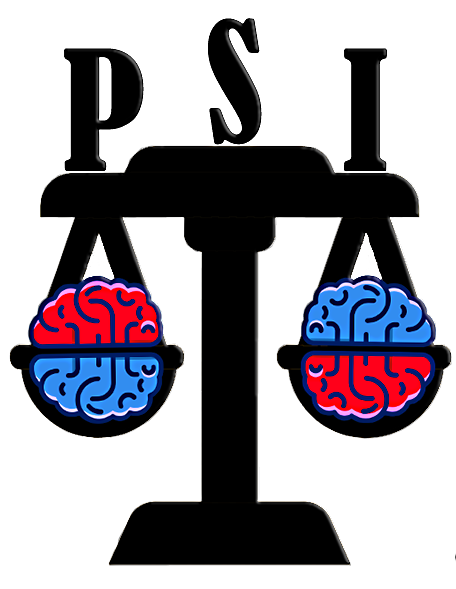Forensic Psychological Expertise
Forensic Psychological Evaluation
Forensic psychological evaluations are in-depth, research-based assessments conducted for legal purposes. These evaluations involve detailed analysis of one or more individuals in the context of court or institutional proceedings. Though emotionally and mentally demanding for those involved, they are essential for legal clarity and justice.
Typically requested by courts or prosecutors, such evaluations may also be initiated by social service institutions or private individuals seeking psychological insight before initiating legal proceedings.

🔍 Scope of Forensic Evaluations
Forensic evaluations are not limited to assessing criminal offenders. They also include:
- Evaluation of victims and witnesses
- Determination of legal competence (e.g., ability to participate in proceedings or sign contracts)
- Civil proceedings, such as custody or divorce disputes
- Assessment of psychological functioning and capacity for work
⚖️ Common Forensic Evaluation Areas
- Custody evaluationsin family court
- Evaluation of psychological damage or trauma
- Assessment of learning difficulties or educational impairments
- Civil competence (legal capacity to participate in legal proceedings)
- Abuse and neglect evaluations(children, elderly, or individuals with disabilities)
- Competence to stand trial(often in cooperation with a neuropsychiatric expert)
- Criminal responsibility(assessment of mental state at the time of the offense)
- Evaluation of motives and intent behind criminal acts
- Risk assessment for future violent or criminal behavior
- Assessment of witnesses– both adults and children
👥 Importance of Team-Based Evaluations
In complex cases, the most comprehensive approach is a team evaluation, typically involving both a forensic psychologist and a forensic neuropsychiatrist. This team produces:
- A psychological report
- A neuropsychiatric report
- A joint expert opinion
These three perspectives may differ, but when they align, they provide exceptionally strong evidence in legal proceedings. Such collaboration enhances both the validity and impact of the findings, especially in criminal trials.
Forensic psychological services also support the broader legal and correctional systems—from criminal investigations and trials to correctional institutions and eventual reintegration into society.
Read more
Forensic psychological evaluations are complex, research-based assessments that involve in-depth psychological examination of one or more individuals—typically for the purpose of legal proceedings conducted before a judicial or institutional body. These expert evaluations are often psychologically demanding for all parties involved, and most individuals do not willingly undergo such evaluations unless legally required.
Such assessments are usually ordered by courts or public prosecutors, though they may also be requested by other institutions (such as centers for social welfare) or by individuals who seek a psychological evaluation prior to initiating legal action.
It is important to note that forensic psychological evaluations are not limited to criminal cases or assessments of criminal offenders. They may also involve:
- Evaluations of victims in legal proceedings
- Assessments of competence to testify or to engage in legal actions (e.g. capacity to be a contractual party or to participate in civil litigation)
- Investigations of psychological factors in family law cases, such as divorce and custody
- Evaluations of psychological functioning, work capacity, and other functional abilities
Areas of Forensic Psychological Evaluation
Forensic evaluations may cover a broad range of areas, including:
- Custody evaluations in family court disputes
- Assessment of psychological injury (emotionally- or trauma-related harm)
- Identification of learning difficulties and developmental impairments
- Evaluation of civil (litigation) competence
- Investigations into abuse and neglect involving children or individuals with psychological and/or physical disabilities
- Assessment of competency to stand trial (in cooperation with a forensic neuropsychiatrist)
- Determination of criminal responsibility (in cooperation with a forensic neuropsychiatrist)
- Assessment of motivation, intent, and diminished capacity for committing a criminal act (also within a multidisciplinary team)
- Evaluation of violence risk
- Assessment of child and adult witnesses participating in legal proceedings
Special Focus: Criminal Forensic Psychology
A particularly specialized domain within forensic psychology is the evaluation and treatment of criminal offenders, including risk assessment for reoffending. This work is deeply embedded in the structure of the criminal justice system—beginning with the detection of criminal activity, arrest by police, handover to the prosecution, trial in court, sentencing to correctional institutions, and finally, reintegration into society. Reintegration is often difficult, especially after long-term institutionalization and usually ineffective treatment within correctional facilities.
Due to the complexity of these evaluations, the most effective approach involves a team of expert witnesses, typically composed of one forensic psychologist and one forensic neuropsychiatrist. This team-based method provides a more comprehensive assessment and significantly enhances the evidentiary value in legal proceedings.
Such team evaluations result in three expert reports:
- A psychological report
- A neuropsychiatric report
- A joint integrated report
These reports may differ, but when they are in agreement, they offer particularly strong legal evidence. The strength of this approach lies in the fact that two expert witnesses are present in court to explain their findings individually, and then provide a joint explanation, reinforcing the clarity, reliability, and depth of the assessment.
